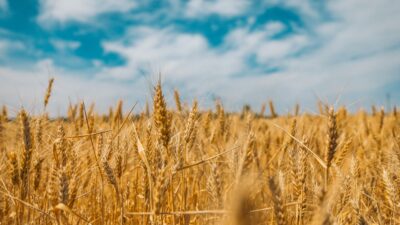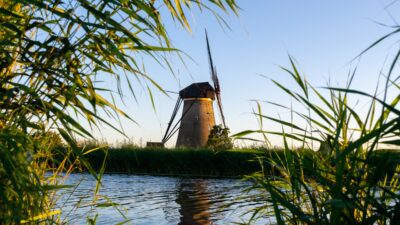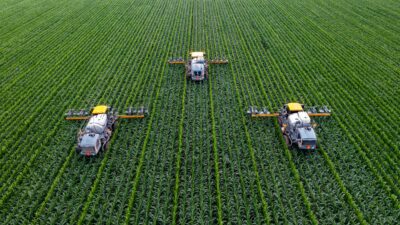Sandra Peter, Kai Riemer and Emily Remnant

The business of bees on The Future, This Week
This week: bees, their economic impact and why it’s so important to protect them, with special guest Emily Remnant.
Sandra Peter (Sydney Business Insights) and Kai Riemer (Digital Disruption Research Group) meet once a week to put their own spin on news that is impacting the future of business in The Future, This Week.
Our guest this week
The Behaviour, Ecology and Evolution Lab (BEE Lab)
The stories this week
04:40 – M&S faces backlash over plan to release 30m honeybees
Other stories we bring up
Musk halts use of bitcoin for Tesla cars over climate concerns
Tesla buys $1.5bn in bitcoin, pushing price to new high
DuckDuckGo’s advertising business model was a commitment to privacy
The Victorian government will go it alone on changes to protect gig economy workers
Fair Work rules dismissed Deliveroo rider is an employee, not an independent contractor
Our previous conversation on The Future, This Week unpacking the gig economy impact
Putting a dollar value and metrics for saving biodiversity
19 Australian ecosystems at risk of collapse
Follow the show on Apple Podcasts, Spotify, Overcast, Google Podcasts, Pocket Casts or wherever you get your podcasts. You can follow Sydney Business Insights on Flipboard, LinkedIn, Twitter and WeChat to keep updated with our latest insights.
Our theme music was composed and played by Linsey Pollak.
Send us your news ideas to sbi@sydney.edu.au.
Dr Sandra Peter is the Director of Sydney Executive Plus at the University of Sydney Business School. Her research and practice focuses on engaging with the future in productive ways, and the impact of emerging technologies on business and society.
Kai Riemer is Professor of Information Technology and Organisation, and Director of Sydney Executive Plus at the University of Sydney Business School. Kai's research interest is in Disruptive Technologies, Enterprise Social Media, Virtual Work, Collaborative Technologies and the Philosophy of Technology.
Emily is a Lecturer and Academic Fellow at the University of Sydney and a member of the Behaviour, Ecology and Evolution (BEE) Lab. Her research focuses on understanding host-parasite interactions and the evolution of virulence in honey bee viruses.
Share
We believe in open and honest access to knowledge. We use a Creative Commons Attribution NoDerivatives licence for our articles and podcasts, so you can republish them for free, online or in print.
Transcript
Disclaimer We'd like to advise that the following program may contain real news, occasional philosophy and ideas that may offend some listeners.
Sandra So, Kai, what should we talk about today?
Kai So we could talk about Elon Musk and Bitcoin and Tesla and why would they stop accepting Bitcoin for environmental reasons when it was clear in February when they started accepting it, that it wasn't environmentally sustainable. And, of course, Elon Musk pumping up the prices of these cryptocurrencies
Sandra And also pushing them down after calling Dogecoin a hustle on Saturday Night Live. But let's not talk about Elon Musk again.
Kai No, that's more a story for the regulators to look at. An interesting story came out in Wired magazine, about DuckDuckGo, the alternative search engine that doesn't actually track you, and why it makes a really interesting point that you can have an advertising based business model that is profitable, DuckDuckGo has been profitable since 2014, that does not rely on privacy invasion, and building elaborate profiles about users.
Sandra So DuckDuckGo is a search engine much like Google and thus have an advertising based revenue model, much like Google, but somehow advertises differently.
Kai It's called contextual targeting, it will just show you ads that correspond with your search terms, with your current activity. But every time you close and open the browser, you'll be a stranger to the search engine, it doesn't keep a profile about you. And so it's a really good example if regulators want to look at what it would take to bring about changes to these big tech business models, and how things could work. Otherwise, I think DuckDuckGo is a really good example for how you can actually be successful without privacy invasion. So something to look at in the future.
Sandra I also have another couple of stories where we said we'll keep an eye on this. And they both have to do with gig work. One of them around the Fair Work Commission ruling that the specific Deliveroo rider is an employee, not an independent contractor, hence the dismissed worker was reinstated. Then that goes back to the conversations that, not just Australia, but also the UK and the US are having around the status of workers on ride sharing or delivery platforms. And just to make it clear that this one decision does not really set a precedent for the industry because of the nature of this industry, and we'll include an article in the shownotes that makes the case that this one decision is not sufficient to change the legislation or the way courts will rule in Australia around this and that also platforms are likely to appeal this decision, but we're seeing more and more things happening in this space. Also, this week, there have been reports that the Victorian Government will go at it alone, and try to make changes to protect gig economy workers, including things like pushing for minimum standards and for dispute resolution processes, and that is likely to put some pressure on the federal government to have another look at the conditions of workers in the gig economy.
Kai And speaking of the gig economy we will include for you in the shownotes, our recent special episode where we looked at different consequences and impact of gig work on the broader society and economy.
Sandra But what we really want to talk about today is bees.
Kai Honeybees because it is World Bee Day this week
Sandra It is indeed, and we've all heard the stories about bees disappearing, and bees actually have a significant contribution to the world economy, $235 billion, almost 10% of the value of world agricultural production is value added by bees, so an important topic.
Kai We have seen a few stories around bees in recent weeks, including one in The Guardian, which confused us because there was a company doing something positive for bees, but then was criticised by conservationists for actually doing the wrong thing by releasing 30 million bees, and so we thought we need some help.
Sandra So we brought in an expert…
Kai We have a guest today, Emily Remnant, who's a geneticist and evolutionary biologist here at the University of Sydney.
Sandra Let's do this.
Kai Let's do this
Intro From The University of Sydney Business School, this is Sydney Business Insights, an initiative that explores the future of business. And you're listening to The Future, This Week where Sandra Peter and Kai Riemer sit down every week to rethink and unlearn trends and technology and business. They discuss the news of the week, question the obvious explore the weird and the wonderful.
Sandra So we do have a guest today, and it's Dr Emily Remnant. Emily is a geneticist and evolutionary biologist investigating how insects respond to changes in their environment, and her area of interest is honeybees. And Emily has won national science awards for her research into how to protect honeybees from viruses that are devastating bees overseas. And you could call her the $6 billion scientist, and that's the value of pollination to the Australian horticultural industry. Welcome, Emily.
Emily Thank you, it's a pleasure to be here.
Sandra So the story we've come across in the Guardian around bees and food crops shortages, and this real threat to global food security if we lose our bees, sent us on this quest to try to understand how bees contribute to agriculture more broadly, not just to our honey needs, and to try to understand what the future might bring, because we've all heard that bees are under threat.
Kai So Emily, the article reports on Marks & Spencer in the UK releasing 30 million honey bees into the wild, so that's setting up 1,000 bee hives across 25 farms in order to farm single estate honey. And they've come under criticism by conservationists, who basically say that this might not be as good an idea as they make it sound because those honey bees might actually be detrimental to other bee populations. So maybe that's a good starting point for talking about, you know, bees are a complex problem.
Emily Absolutely, so we all know the European honeybee, it's the bee that we use across the world for pollination, it's the…
Kai Workhorse
Emily The workhorse exactly, but it's just one of about 20,000 species across the world of bees. And so the wild bees are very important for all ecosystems, they are the pollinators of our native plants. So perhaps this issue has come under scrutiny, because if you're releasing the European bee into areas that have a lot of native pollinators, there is the potential that they might outcompete those native bees like bumble bees and other individual bee species. So it certainly sounds a bit more like a marketing ploy, then a conservation issue if you ask for my opinion on that one.
Kai Yeah, and the article makes the point that the issue might not be that there is not enough bees, but that there's actually a shortage of pollen of flowers in certain areas, and then you release more bees, and that might actually crowd out and threaten some of the native species.
Emily Certainly, bees need pollen and nectar for survival. And in doing so, they pollinate the plants in different bee species have different flowers that they can pollinate better than others. So it depends on the type of flower and the type of bee. There are some bee species that have one flower that they rely on. And if a honeybee is stealing all of their pollen and nectar, then that species will suffer.
Kai It's a bit like the koala of the bee world.
Emily Pretty much. Yeah, you know, this co-evolution between flower and pollinator is something that has really been a huge evolutionary expansion over evolutionary time.
Sandra So we're going to talk soon about how bees really contribute to what is big business in agriculture. But before that, maybe a quick primer on how do bees work? How many of them do we have here in Australia and around the world? And what role do they exactly play in our agricultural systems?
Emily So we're talking now about the honeybee apis mellifera, the European bee and this bee is the bee that we've used for centuries as a pollinator for our agricultural crops. We use it because it's really easy to manage so you can grow bees in boxes, and you can move those boxes around. We do also get a lot of pollination services from all the other wild bees but, yeah, managed honeybees are really what has propelled agriculture forward. Now a bee hive it's got a queen bee, so every hive has one queen, and she is a bit bigger than the other bees. And she produces a pheromone that the bees detect and they basically care for her, they feed her and they look after all of the eggs that she lays.
Kai So they congregate around her.
Emily They do, they have retinue pheromone where she has all of her subjects hanging around her and –
Kai So if you want to build a beehive, you need a queen.
Emily Absolutely
Kai And the, okay,
Emily Yes, but you also need the workers and there we can be up to about 40 or 50,000 worker bees in a really big hive
Kai And they're female?
Emily They are female, and they do all the work. So they collect pollen, the nectar, they care for the developing baby bees, the pupae in the larvae, and they also kept queen and then we also have the male bees, the drones. So there's probably about 1,000 drones per hive in the mating season around spring time and summer. And the drones are, their sole purpose basically is for mating, so they are put out into the world every spring and their goal is to find a virgin queen and mate with her.
Kai So a different queen, not the one of the hive?
Emily No.
Kai They go out and find a new queen?
Emily Yes. So every hive will also make some virgin queens. And these virgin queens have this mating flight, which occurs in a open field. And we have heaps of other colonies around, so drones from all the other colonies, probably in a few kilometers radius, will go to this drone congregation site in the meeting field and wait for the queen to arrive. And this occurs about the same time every day. So around two or three o'clock, the virgin queen will leave her native hive and she will go to this drone congregation area and mate with the drones. So you could have 1,000s of drones congregating here every day, and she will mate with up to 20, maybe 30, of these drones in a successful meeting flight.
Kai And then what happens to the, what happens?
Emily Drones
Kai Yeah, so what happens to the drones that mate and to the other drones? It's pretty competitive.
Emily It's not a good life for a drone. So drones will, when they mate, their abdomens, essentially they explode and they will die. So if they successfully mate that's the end of their life.
Kai They have fulfilled their purpose.
Emily Exactly. Now if you don't mate, the drones will return back home and hang out and wait for the next day and perhaps go and find another queen to mate with. But if they don't, by the end of mating season, they'll be basically kicked out by the colony because they're of no use anymore and they take a lot of work to look after and they don't help out with the duties of the hive.
Kai And they just hang around do nothing, they just wait to mate and if they're not successful, they'll be shunned.
Emily Kicked out.
Sandra And if they're successful, they die.
Emily Yep.
Kai If they're successful they explode otherwise they have to die alone.
Emily Exactly, yep, so that –
Kai Okay, I'll go away and contemplate that.
Sandra But you said 50,000 bees in a hive and how many hives just in Australia alone?
Emily So in Australia, we have about half a million registered hives. So that's where beekeepers have registered those hives, and then we would have probably the equivalent number again of feral hives, if not more, I'm not sure of the current estimates of feral hives and they're hives that just occur in tree trunks, or, just not managed by beekeepers.
Kai So basically…
Sandra Someone's garage.
Kai Basically a virgin queen got away and and basically founded her own colony.
Sandra So how many bees is that?
Kai That's about up to 50 billion bees. That's a lot of livestock, it's more than we have cows for sure.
Emily Absolutely, so it's such a huge part of our agricultural industry, and bees have this essential service for pollination for over two thirds of crops. So yeah, we definitely rely on them for that.
Kai So no bees, no apples, no veggies,
Emily No, all our fruit, nuts, seeds, that sort of thing are bee pollinated, or if not solely bee pollinated, definitely, we have a lot of improvements when we use bee pollination. So some crops rely on bees less, others are 100% reliant on bee pollination. And one that springs to mind is the almond pollination industry. So Australia produces about 7% of the world's almonds, it's a second biggest producer of almonds. It is one of our biggest horticultural exports and it relies on bee pollination. And that all occurs in one month of the year in August, where about 1/3 of all hives from Australian beekeepers are moved to one area of the country for the almond pollination,
Kai That's more than 150,000 hives.
Emily Exactly, it's one of the biggest livestock movements in the country and it occurs every year, so they stay there for about three weeks just pollinating almond crops, and that's in the Mildura region.
Kai So it's a big festival.
Emily It is, yes, it is. So, you know, you can load up trucks with bee colonies and transport them quite long distances. And that also occurs across North America for the Californian almond pollination. And it's one area where having healthy bee colonies is essential to the success of that industry.
Sandra And that is, as we've said before, this huge business, so at least $6 billion in Australia, but about $235 billion US dollars, which is the value of the insect pollination services around the world. That is almost 10% of the value of world agricultural production, just through bee value add.
Kai And we found an article in the Guardian, which is from last July, which reports on studies that have been done across the US which found that there's actual loss in crop production from bee shortages. And they don't just report on not having enough honeybees but also on the fact that in some areas, wild bee populations have been decimated and that they actually offer their free labor normally in helping to pollinate them, when they fall away, that actually significantly impacts on the production of crops.
Sandra So how do we think about bee decline? And how do we think about the flow on effects of that on agriculture?
Emily So yeah, we've heard a lot about honeybee declines. And it's a bit of an interesting question, so we need to be careful how we think about the topic because there's two branches to this one is the loss of apis mellifera, honeybee colonies, managed hives, and the other is the flow on effects to the native pollinators, which definitely have a huge impact in incidental pollination. So honeybees themselves have had lots of different environmental threats, which have caused declines and it makes beekeeping much harder. So one of those is the impact of parasites and pathogens. So we have a particularly dangerous mite call the Varroa destructor mite. And that is a parasite of honeybees, it will suck on the fat of the honeybees, and it causes the base to weaken, it also transmits viruses between bees. And this is thought to be one of the major impacts on colony losses around the world. In Australia we're quite lucky, we don't have this mite so our bees do not suffer from the same viruses that Varroa will bring to other colonies around the world.
Kai So just to get that straight, there is a worldwide pandemic going on with this virus in honeybees that the mite plays a role in and Australia got lucky, we kept it out.
Emily Yes, we kept our borders shut.
Kai Sound familiar?
Emily So yeah, we've had some excellent biosecurity operations in Australia that have kept the mite out.
Kai So what happens when a, you know, bees arrive in a shipping container and they have the mite?
Emily So we have a few different programs, we have a sentinel hive program, which is located in ports and such things, which captures any of those hives, we also have inspections from biosecurity, and if we do get an incursion from bee population, which has occurred a few times, one recently, a couple of years ago in Townsville, we have an eradication program and that is basically like contact tracing. So biosecurity team will track down and locate any of those invasive hives and remove them. And that has kept the mite out of our country for quite a while now.
Kai Fortress Australia, keeping the viruses at bay
Emily Definitely.
Kai So other parts of the world haven't been as lucky. So this mite and the viruses are quite rampant in Europe and North America.
Emily That's right, so in some states of North America, they report up to 40% of honeybee colonies losses due to Varroa mite. And so the mite clearly has an impact on beekeeping operations, though, if we were to worry whether bees were going to become extinct, I think that's not a concern that we have for the honeybee. It's just that it makes a beekeeper's job a lot harder to build those colonies back up each season. So they have enough hives for the next round of pollination
Kai So it drives the cost up and it keeps the numbers down, so you can't actually scale things up as…
Emily It's very challenging for beekeepers to scale up under these conditions.
Kai And just out of interest, how does it work, the you know, the relationship between the virus and the mite? Can the virus jump from bee to bee? Or is it, does it need the mite? How does that work?
Emily So the viruses used to jump from bee to bee just by contact and feeding, they can even jump from bees on plants, so you can pick up viruses on flowers.
Sandra So this is a bee coughing on another bee or…?
Emily Yes.
Sandra Touching a surface…
Emily Yeah, exactly, yes. But with a mite, now it provides the virus a direct route into the bee's body. So it bites the abdomen of the bee, basically will suck on our equivalent of a liver. And in doing so it adds viral particles that get into the system and cause damage to the bee that way as well.
Sandra How big is this mite?
Emily They're about the size of a sesame seed so to a bee that's like the equivalent of us having a little monkey on our back sucking on our livers and they feed on the baby bees developing in the brood and then they hitchhike on the adult bees so they can jump out into other colonies. So yeah, they're quite large relative to the bee like having a little frisbee on your back permanently.
Kai So what I'm hearing is that the virus is helped along by little monkeys sitting on the bees backs, weakening them, does the mite have carry the virus?
Emily It does. So the mite will take the virus from a first be that it's feeding on, and then it can transmit it to the next bee, so it's like a vector, so you might think of mosquitoes that can transmit Dengue fever or something like that. This might is the equivalent of a mosquito to honeybees.
Sandra You said earlier that Australia does not actually have this mite, that we've somehow escaped this pandemic, this worldwide pandemic. How did that happen?
Emily I think the biosecurity measures in place, I think because we stopped importing bees from overseas that prevented mites from coming in. I also think our isolation has helped.
Sandra So we've never had it in the first place?
Emily We've had some incursions that have been eliminated by biosecurity teams in Queensland and at the ports and things like that.
Kai So it's not possible to import any bees at all, or do they have to go into a quarantine hotel, or?
Emily There are some routes to importing bees, we have a queen bee importation process, which requires quarantine. So that's one way of getting new genetic material into the country, avoiding importing a whole colony where the risk of getting a mite is much larger. So we do have some routes of importation, yes.
Sandra So we've spoken a bit about the decline of the honeybee, but other species of bees are in decline as well.
Emily Absolutely, so I think the flow on effects from all of these environmental stresses that the honeybee experiences are being felt in all the wild bees as well. So things like pesticide use, diseases from bees that can spill over into wild species of bee, climate change, habitat loss, and other general impacts of land clearing and agricultural practices can impact our wild pollinators as well.
Kai You said earlier, there's about 20,000 known species of bees worldwide. How many species do we use for honey production? How many species do we have in Australia in total?
Emily So in total, Australia has about 2,000 native bees most agriculture relies on the European honeybee, which is non-native. We also do have some native bee species that we use for pollination. So we have stingless bees, that are excellent pollinators of some crops like macadamias, and avocado, blueberry. We do have a lot of people doing research on other native pollinators and how they can value add to the honeybee pollination. And I think an approach that combines all of these pollination efforts will be the ultimate way forward.
Kai We've read an article in Wired magazine with this January, which reports on a global study that found that about a quarter of all known species haven't been seen since 1990. And that's despite having better ways of tracking them. There's a lot of citizen science where people, you know, report bees and they track things. And while we have a better reporting system, a lot of species have gone missing, or at least declined to the point where we don't actually see numbers that are being reported. So that's the issue that we're talking about, is that trend increasing?
Emily I think that's a really complicated question, but there are many reports of a general observations of insect declines in various parts of the world. So it's often alarmingly termed the insect armageddon or "insectageddon". And we have reports from longitudinal studies carried out over decades, that observe a huge reduction in the insect biomass in various parts of the world. So there is definitely cause for concern that insect populations are on decline and the impacts that will have on our ecosystems can be quite dramatic.
Sandra So what would actually happen if bees disappeared, or if we lost many, many bees?
Emily Well, I think in an ecological sense, bees are considered a keystone species. And that's a species that has a disproportionate impact on the functioning of an ecosystem. So if we lose that species, the downstream effects are very dramatic. So bees pollinate the plants, and those plants require those bees to reproduce. But many different organisms in an ecosystem require those plants to survive. So it has a ripple effect that will impact all organisms in that particular ecosystem. So in that sense, we would suffer from ecosystem decline. And there has been a recent report that's looked at the ecosystem health of Australian ecosystems, and of the 19 ecosystems that were studied, all of those ecosystems were found to be in decline, and insects would be playing a very important role in those ecosystems, including bees.
Sandra But unfortunately, ecosystem decline is much harder to measure than things like climate change in general. And we've come across research out of Harvard reported in The Conversation that was making the point that it's actually quite difficult to put a number, a dollar value on ecosystem decline and on environmental degradation, unlike the fight for climate change, which has very clear, very measurable goals for instance, to reduce greenhouse gas emissions, there is no metric for saving biodiversity, there is no metric for how do we measure, how well we're doing on saving ecosystems. And one way forward, reported there, is the United Nations framework for standardising ecosystem accounting, that's from a couple of months ago, with guidelines helping countries to track changes in their ecosystems and to provide baselines. And Australia is one of the countries that's contributed to this. But while there are other ways in which we can think of building a healthy ecosystem or a healthy pollination system?
Emily I think considering our agricultural system in the context of insect declines is essential. So we need to start doing things like fostering pollinator health, rather than maximising production and the two work hand in hand. So by having healthy pollinators, it will improve yields, ultimately. One way could be to move away from the use of broad spectrum insecticides that kill all insects, and focus on ones that are pest specific. Also to cultivate refuges for native pollinators that have, you know, highly diverse floral resources. So they're not simply foraging on one crop, it's a bit like eating McDonald's every day. So you want to be cultivating an environment that fosters the health of the pollinators rather than just relying on those pollinators to do their job for your crop.
Kai So the important thing here is not just to look after beekeepers in their hives and trucking around the country those bee hives, but actually strengthen the native pollinators. Because we've seen in these studies in the US that native bees often not accounted for actually play that hidden role in actually taking a brunt of the work in pollinating on top of what we can do with honeybees.
Emily That's right, so they will be doing a lot of incidental pollination that really can't be measured, and we want to maximise that. And also the bees that we do manage in hives, we want those bees to remain healthy and current practices could be hindering that. So if we can improve the ways of treating the colonies, they might be better at surviving other threats.
Kai Would it be possible to put a dollar figure on the value of native pollinators? I mean, what you just said, Sandra, those initiatives to try and measure the value of nature in helping in agriculture, for example, that's probably much harder than you know, quantifying what the registered bee population can do for us.
Emily Absolutely. I wouldn't even want to take a stab, I think I'll just go the MasterCard route and say it's priceless. I think the impacts of native pollinators could be far beyond what we can measure.
Kai And that is not just because of their impact on crops, but also because they support the ecosystem more broadly.
Emily Yeah, so I think one way of putting it is ecosystem services, and our honeybees and native bees are providing these services without us even knowing.
Sandra And we're really seem to have not many other alternatives for expanding our food production over the next few years given the demands of a growing population, and that bees pollinate about 75% of our crops.
Emily We have a growing need to increase yields and I don't think anything could substitute the role of the bee as efficiently. Hand pollination has been trialed in certain areas but I think in terms of the ability for a hive of bees to pollinate a plant compared to a human with a brush, we're really not able to match that efficiency and high yields and success. So we should keep the bees healthy for that alone.
Kai 50,000 bees compared with humans and the brush, I think we can all agree that these little workers are probably much, much more efficient. So we need to keep our ecosystems healthy if we want to grow our food supply. If there was one thing you would tell the general public or our politicians for World Bee Day, what would that be?
Emily I think being aware of the many impacts that be suffer and trying to minimise your own personal footprint on that. Some ways of doing that could be don't spray that pest in your house, let it be and avoid unnecessary pesticide use, or plant a garden rich in flowers that flower all throughout the year, not just in springtime, those sorts of things, I know it seems like they will have a minor impact in the long run but if everybody's doing something like that, certainly going to improve the bees that we have in Australia. Another thing is to support your local beekeepers, so go to farmers markets and buy their honey rather than to big supermarket companies that are mixing honey with other things, you know, you know that if you get to know your beekeeper and get to know what they produce, you're getting a really good, beautiful product and it's worth every penny.
Kai Excellent, thank you so much.
Sandra Emily, thank you so much and Happy World Bee Day.
Emily Thank you, happy Bee Day.
Kai Thank you and thanks for listening.
Sandra Thanks for listening.
Outro This was The Future, This Week, an initiative of The University of Sydney Business School. Sandra Peter is the Director of Sydney Business Insights and Kai Riemer is Professor of Information Technology and Organisation. Connect with us on LinkedIn, Twitter and Flipboard, and subscribe, like or leave us a rating wherever you get your podcasts. If you have any weird and wonderful topics for us to discuss, send them to sbi@sydney.edu.au.
Close transcript







